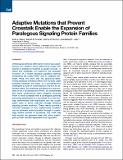Adaptive Mutations that Prevent Crosstalk Enable the Expansion of Paralogous Signaling Protein Families
Author(s)
Capra, Emily Jordan; Perchuk, Barrett; Skerker, Jeffrey M.; Laub, Michael T.
DownloadCapra-2012-Adaptive Mutations t.pdf (1.411Mb)
PUBLISHER_POLICY
Publisher Policy
Article is made available in accordance with the publisher's policy and may be subject to US copyright law. Please refer to the publisher's site for terms of use.
Terms of use
Metadata
Show full item recordAbstract
Orthologous proteins often harbor numerous substitutions, but whether these differences result from neutral or adaptive processes is usually unclear. To tackle this challenge, we examined the divergent evolution of a model bacterial signaling pathway comprising the kinase PhoR and its cognate substrate PhoB. We show that the specificity-determining residues of these proteins are typically under purifying selection but have, in α-proteobacteria, undergone a burst of diversification followed by extended stasis. By reversing mutations that accumulated in an α-proteobacterial PhoR, we demonstrate that these substitutions were adaptive, enabling PhoR to avoid crosstalk with a paralogous pathway that arose specifically in α-proteobacteria. Our findings demonstrate that duplication and the subsequent need to avoid crosstalk strongly influence signaling protein evolution. These results provide a concrete example of how system-wide insulation can be achieved postduplication through a surprisingly limited number of mutations. Our work may help explain the apparent ease with which paralogous protein families expanded in all organisms.
Date issued
2012-07Department
Massachusetts Institute of Technology. Department of BiologyJournal
Cell
Publisher
Elsevier B.V.
Citation
Capra, Emily J., Barrett S. Perchuk, Jeffrey M. Skerker, and Michael T. Laub. “Adaptive Mutations That Prevent Crosstalk Enable the Expansion of Paralogous Signaling Protein Families.” Cell 150, no. 1 (July 2012): 222–232. © 2012 Elsevier Inc.
Version: Final published version
ISSN
00928674